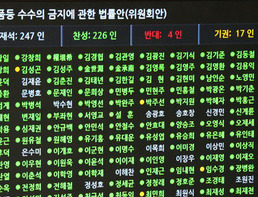 |
The results of lawmakers voting at the National Assembly in Seoul on Mar. 3 are posted on an overhead screen, with 226 in favor, four opposed and 17 abstaining. (by Lee Jeong-woo, staff photographer)
|
Saturday, March 7, 2015
The Kim Young-ran act must not be defanged with dubious exemptions
As policies take effect, migratory trends leading away from the Seoul area
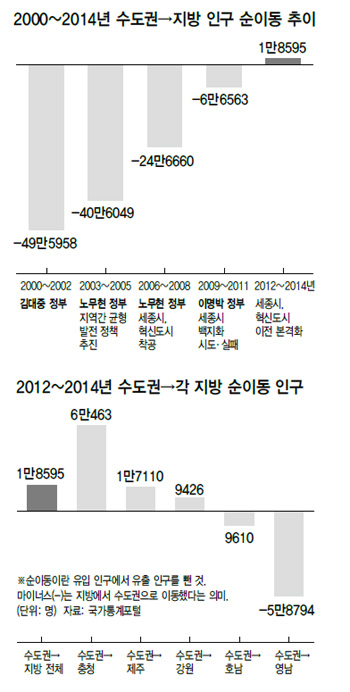 |
Nationwide, young people continue to move to Seoul, while more baby boomers leaving the big city
Net population movements have begun shifting away from the greater Seoul area as balanced regional development policies launched during the Roh Moo-hyun administration have started taking effect.The ‘Samsung Man’ From can-do spirit to innovation, employee standards continue to evolve
One out of 100 salaried workers in Korea works at Samsung Group ― the nation’s largest conglomerate with 30 affiliates. There are around 490,000 Samsung employees, with half of them working outside Korea.
Most Koreans have respect for big family-run businesses that have contributed to laying the foundation for today’s economic prosperity over the past decades. Working at Samsung, among others, has long been considered a social status symbol.
The so-called “Samsung Man” refers to the most talented elite people here. They are also the highest-paid employees who enjoy the best welfare benefits.

Now the cachet may be weakening as more job options are available. But still almost 200,000 people apply every year for the Samsung Aptitude Test, the group’s unique entrance exam.
The word Samsung Man also represents the can-do spirit of older generations who used to prioritize work over their personal life and never hesitate to sacrifice whenever the company requires.
Under the charismatic leadership of chairman Lee Kun-hee, the loyalty and integrity of employees has shaped not just Samsung’s own corporate culture but also the overall image for Korean workers.
But now at a time when his son Lee Jay-yong, vice chairman of Samsung Electronics, is taking charge, a generational transition is also underway among employees.
A work-life balance is crucial for younger generations. They work as a team if necessary but also want their individual achievements to be fully evaluated. When these needs are not met properly, they are willing to give up the coveted job.
Reflecting the changing atmosphere, Samsung hires more workers than other conglomerates while losing them at a faster pace.
The turnover rate at Samsung Electronics stands at about 10 percent, which compares to some 2 percent at other big companies like LG Electronics and POSCO.
“I still think Samsung is the best workplace in Korea, but the demanding job didn’t work for me,” said a 35-year-old former Samsung Electronics worker who relocated to a state-run corporation two years ago.
Another 30-something copywriter working at Cheil Worldwide, a Samsung-affiliated advertising firm, said he was considering moving to a foreign company. “I feel limitations to shine as an individual here,” he said.
At a time when Samsung is desperately seeking new growth engines amid the rapid saturation of its core businesses, it is facing a tricky situation coping with the generational transition among employees while continuing its growth momentum at the same time.
As part of its efforts, the group has recently decided to overhaul its decades-old hiring system.
It plans to abolish the entrance exam and focus more on applicants’ personality and on-site experiences rather than their schools and English fluency. And the new push is expected to affect the hiring process of other conglomerates, too.
This week’s Weekender explores the meaning of being a Samsung Man in Korea and the business empire’s ever-evolving corporate culture.
By Lee Ji-yoon (jylee@heraldcorp.com)
Most Koreans have respect for big family-run businesses that have contributed to laying the foundation for today’s economic prosperity over the past decades. Working at Samsung, among others, has long been considered a social status symbol.
The so-called “Samsung Man” refers to the most talented elite people here. They are also the highest-paid employees who enjoy the best welfare benefits.

Now the cachet may be weakening as more job options are available. But still almost 200,000 people apply every year for the Samsung Aptitude Test, the group’s unique entrance exam.
The word Samsung Man also represents the can-do spirit of older generations who used to prioritize work over their personal life and never hesitate to sacrifice whenever the company requires.
Under the charismatic leadership of chairman Lee Kun-hee, the loyalty and integrity of employees has shaped not just Samsung’s own corporate culture but also the overall image for Korean workers.
But now at a time when his son Lee Jay-yong, vice chairman of Samsung Electronics, is taking charge, a generational transition is also underway among employees.
A work-life balance is crucial for younger generations. They work as a team if necessary but also want their individual achievements to be fully evaluated. When these needs are not met properly, they are willing to give up the coveted job.
Reflecting the changing atmosphere, Samsung hires more workers than other conglomerates while losing them at a faster pace.
The turnover rate at Samsung Electronics stands at about 10 percent, which compares to some 2 percent at other big companies like LG Electronics and POSCO.
“I still think Samsung is the best workplace in Korea, but the demanding job didn’t work for me,” said a 35-year-old former Samsung Electronics worker who relocated to a state-run corporation two years ago.
Another 30-something copywriter working at Cheil Worldwide, a Samsung-affiliated advertising firm, said he was considering moving to a foreign company. “I feel limitations to shine as an individual here,” he said.
At a time when Samsung is desperately seeking new growth engines amid the rapid saturation of its core businesses, it is facing a tricky situation coping with the generational transition among employees while continuing its growth momentum at the same time.
As part of its efforts, the group has recently decided to overhaul its decades-old hiring system.
It plans to abolish the entrance exam and focus more on applicants’ personality and on-site experiences rather than their schools and English fluency. And the new push is expected to affect the hiring process of other conglomerates, too.
This week’s Weekender explores the meaning of being a Samsung Man in Korea and the business empire’s ever-evolving corporate culture.
By Lee Ji-yoon (jylee@heraldcorp.com)
Recently extended nuke reactor doesn’t meet safety standards
Wolseong reactor 1 had its lifespan stretched in late February, but doesn’t have proper conduit to remove spent fuel
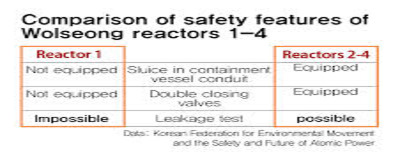 |
Comparison of safety features of Wolseong reactors 1-4
|
Parts of Kim Young-ran could be revoked even before the law takes effect
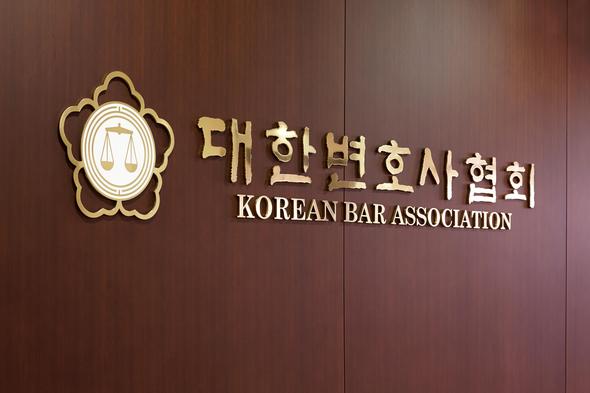 |
The headquarters of the Korean Bar Association in Seoul.
|
Korean Bar Association seeking a Constitutional Court review of the anti-corruption law
With the Korean Bar Association planning to ask the Constitutional Court to review the Kim Young-ran Act, some sections of the law may be in danger of being revoked before the law even takes effect.China says summit with N. Korea to take place when 'convenient'
The leaders of North Korea and China may meet when their schedules are "convenient," Chinese Foreign Minister Wang Yi said Sunday, signaling the possibility of a North Korea-China summit despite long-running standoffs over the North's nuclear ambition.
North Korea's young leader, Kim Jong-un, has yet to visit China since taking the helm of the reclusive state in late 2011, while Russia has said that Kim would be among those attending a May 9 ceremony marking the 70th anniversary of the Soviet victory over Nazi Germany in World War II.
Political ties between North Korea and China remain strained, particularly after the North's third nuclear test in February 2013.
Asked whether North Korea's Kim could visit China this year, Wang replied, "As to when our leaders will meet, we will have to see when it is convenient for both parties."
"The China-North Korea relationship has a strong foundation. It should not and will not be affected by temporary events," Wang said.
North Korea is China's only formal treaty ally, but Beijing's leadership has appeared to become increasingly frustrated by the North's nuclear and missile ambitions.
Analysts say North Korea won't give up its nuclear weapons program because having it would prolong the Kim regime and help obtain political and economic benefits from the international community.
With China cold-shouldering North Korea's nuclear policy, Pyongyang is seeking to deepen both diplomatic and economic ties with Russia.
North Korean Foreign Minister Ri Su-yong told a U.N. meeting last week that Pyongyang would strongly respond to ongoing joint military drills between South Korea and the United States.
Wang urged all relevant countries to exercise calm and restraint on the Korean Peninsula, saying the situation there "is entering another delicate period."
"We call on the relevant countries to exercise calm and restraint and say and do things that will have a positive effect so as to continue fostering an atmosphere and conditions for resuming the six-party talks," Wang said.
The six-party talks, aimed at persuading North Korea to give up its nuclear ambition, have been dormant for nearly six years. The talks involve South Korea, North Korea, the U.S., China, Russia and Japan.
North Korea has called for the resumption of the six-party talks without preconditions, but South Korea and the U.S. insist that the North should first show its sincere commitment toward forgoing its nuclear weapons program. (Yonhap)
North Korea's young leader, Kim Jong-un, has yet to visit China since taking the helm of the reclusive state in late 2011, while Russia has said that Kim would be among those attending a May 9 ceremony marking the 70th anniversary of the Soviet victory over Nazi Germany in World War II.
Political ties between North Korea and China remain strained, particularly after the North's third nuclear test in February 2013.
Asked whether North Korea's Kim could visit China this year, Wang replied, "As to when our leaders will meet, we will have to see when it is convenient for both parties."
"The China-North Korea relationship has a strong foundation. It should not and will not be affected by temporary events," Wang said.
North Korea is China's only formal treaty ally, but Beijing's leadership has appeared to become increasingly frustrated by the North's nuclear and missile ambitions.
Analysts say North Korea won't give up its nuclear weapons program because having it would prolong the Kim regime and help obtain political and economic benefits from the international community.
With China cold-shouldering North Korea's nuclear policy, Pyongyang is seeking to deepen both diplomatic and economic ties with Russia.
North Korean Foreign Minister Ri Su-yong told a U.N. meeting last week that Pyongyang would strongly respond to ongoing joint military drills between South Korea and the United States.
Wang urged all relevant countries to exercise calm and restraint on the Korean Peninsula, saying the situation there "is entering another delicate period."
"We call on the relevant countries to exercise calm and restraint and say and do things that will have a positive effect so as to continue fostering an atmosphere and conditions for resuming the six-party talks," Wang said.
The six-party talks, aimed at persuading North Korea to give up its nuclear ambition, have been dormant for nearly six years. The talks involve South Korea, North Korea, the U.S., China, Russia and Japan.
North Korea has called for the resumption of the six-party talks without preconditions, but South Korea and the U.S. insist that the North should first show its sincere commitment toward forgoing its nuclear weapons program. (Yonhap)
Friday, March 6, 2015
호주 한인들, ‘박근혜 정권 퇴진’ 요구 나서
http://news.khan.co.kr/kh_news/khan_art_view.html?artid=201503061409331&code=970207&nv=stand
미국에 이어 호주에 거주하는 한인들이 박근혜 대통령 퇴진을 요구하는 시위를 연다.
6일 호주 현지에서 한국어로 발행되는 신문인 <호주국민헤럴드>에 실린 광고를 보면, 이달 13일 오후 3시 호주 시드니 한국 총영사관 앞에서 ‘박근혜 퇴진 시드니 한인 행동의 날’이 개최될 예정이다.
광고에 실린 ‘박근혜 퇴진을 위한 우리의 행동’이라는 제목의 글에서 호주 한인들은 박근혜 정권 퇴진, 비정규직 해체, 친일 독재 자본 세력 척결 등을 요구했다. 이 광고에는 미주 한인들의 시위 사진도 실렸다.

아래는 광고에 실린 글 전문.
미국에 이어 호주에 거주하는 한인들이 박근혜 대통령 퇴진을 요구하는 시위를 연다.
6일 호주 현지에서 한국어로 발행되는 신문인 <호주국민헤럴드>에 실린 광고를 보면, 이달 13일 오후 3시 호주 시드니 한국 총영사관 앞에서 ‘박근혜 퇴진 시드니 한인 행동의 날’이 개최될 예정이다.
광고에 실린 ‘박근혜 퇴진을 위한 우리의 행동’이라는 제목의 글에서 호주 한인들은 박근혜 정권 퇴진, 비정규직 해체, 친일 독재 자본 세력 척결 등을 요구했다. 이 광고에는 미주 한인들의 시위 사진도 실렸다.

<호주국민헤럴드>에 실린 광고.
아래는 광고에 실린 글 전문.
‘박근혜 퇴진을 위한 우리의 행동’
한국의 정부 수립 이후 60여년 동안 친일 독재 자본의 정권에 의해 우리 민중의 삶은 무참히 짓밟혔다. 친일 독재 자본의 정점에 있는 박근혜 정권은 조작과 날조, 그리고 온갖 거짓으로 민중 수탈의 강도를 점차 극대화시키고 있다.
박근혜 정권은 이미 태생부터 불법한 정권이었다. 국정원, 국방부 사이버사 등을 동원, 전대미문의 사전 불법 선거운동을 자행해 정권을 찬탈했다.
불법한 박근혜 정권은 주지하다시피, 300여명의 어린 생명을 수장시킨 세월호 살인 사건으로 하늘과 사람을 분노케 했다. 또 노동자들은 이 추운 겨울에 공장의 굴뚝에서, 차가운 콘크리트 바닥을 기며 최소한의 생존을 호소하고 있다.
OECD 국가 중 청년 실업률 최고, 자살률 최고, 빈부 격차 최고, 출생률 최저 등 더 이상 열거할 수 없을 만큼의 생지옥 속에서, 조국은 가진 자는 더 많이 갖기 위해, 없는 자는 살아남기 위해 극도의 이기심과 적자생존의 천박한 사회로 전락했다.
우리는 이같은 조국의 현실을 바라보면서 그 상황을 바라만 보는 것은 동포로서의 직무유기이며, 인간의 본성을 저버리는 행위로 여긴다. 이제 우리의 온 힘을 모아 조국의 변혁을 위한 최대한의 노력을 기울이며 아래의 요구가 관철될 때까지 싸워나갈 것이다.
1. 친일 독재 자본의 화신 박근혜의 퇴진을 강력히 추진한다.
1. 사회 최대 병폐인 비정규직의 해체를 위해 노력한다.
1. 사회 기득권을 형성하고 있는 친일 독재 자본 세력의 척결을 위해 노력한다.
1. 우리는 우리의 요구가 관철될 때까지 전세계 민중세력과 연대해 끝까지 싸워 나갈 것을 다짐한다.
한국의 정부 수립 이후 60여년 동안 친일 독재 자본의 정권에 의해 우리 민중의 삶은 무참히 짓밟혔다. 친일 독재 자본의 정점에 있는 박근혜 정권은 조작과 날조, 그리고 온갖 거짓으로 민중 수탈의 강도를 점차 극대화시키고 있다.
박근혜 정권은 이미 태생부터 불법한 정권이었다. 국정원, 국방부 사이버사 등을 동원, 전대미문의 사전 불법 선거운동을 자행해 정권을 찬탈했다.
불법한 박근혜 정권은 주지하다시피, 300여명의 어린 생명을 수장시킨 세월호 살인 사건으로 하늘과 사람을 분노케 했다. 또 노동자들은 이 추운 겨울에 공장의 굴뚝에서, 차가운 콘크리트 바닥을 기며 최소한의 생존을 호소하고 있다.
OECD 국가 중 청년 실업률 최고, 자살률 최고, 빈부 격차 최고, 출생률 최저 등 더 이상 열거할 수 없을 만큼의 생지옥 속에서, 조국은 가진 자는 더 많이 갖기 위해, 없는 자는 살아남기 위해 극도의 이기심과 적자생존의 천박한 사회로 전락했다.
우리는 이같은 조국의 현실을 바라보면서 그 상황을 바라만 보는 것은 동포로서의 직무유기이며, 인간의 본성을 저버리는 행위로 여긴다. 이제 우리의 온 힘을 모아 조국의 변혁을 위한 최대한의 노력을 기울이며 아래의 요구가 관철될 때까지 싸워나갈 것이다.
1. 친일 독재 자본의 화신 박근혜의 퇴진을 강력히 추진한다.
1. 사회 최대 병폐인 비정규직의 해체를 위해 노력한다.
1. 우리는 우리의 요구가 관철될 때까지 전세계 민중세력과 연대해 끝까지 싸워 나갈 것을 다짐한다.
Thursday, March 5, 2015
Anticorruption law causes stir
Calls for changes to the hard-hitting antigraft bill that passed the National Assembly on Tuesday are escalating as journalists, teachers, legal professionals and some lawmakers argue the new restrictions may be unconstitutional, unfair and abusive.
The Assembly, faced with growing criticism for sidestepping any clauses that would directly impact the incumbent lawmakers in their hasty push for the bill, hinted revisions could be unavoidable before the bill goes into effect in 18 months.
“(We) will listen humbly to all voices concerning any inadequate parts and side effects and revise the bill as necessary during the preparation period for the enactment,” ruling Saenuri Party floor leader Rep. Yoo Seong-min said Wednesday. He added that his party would work closely with the government in setting the upper limit of monetary gifts allowed for business purposes.
The so-called Kim Young-ran bill passed in the Assembly on Tuesday with over 90 percent approving the bill. The law aims to make it illegal for civil servants, journalists and teachers to receive more than 1 million won ($911) in cash or gifts, regardless of the occasion.
While public calls for the bill have been fierce, both members of the Saenuri Party and the main opposition New Politics Alliance for Democracy and have expressed worries that the bill could bring side effects, such as by challenging the Constitution.
Questions also linger over the range of people who are subject to the bill, as well as the ambiguity regarding punishments for officials from the civilian sector.
The Anti-Corruption and Civil Rights Commission, the driving force behind the bill’s enactment, also said review of the bill would continue for smooth enforcement.
“The bill touches on an area that was never regulated before, so a clash of opinions is inevitable … We will sort out the issues concerning the bill during the 1 1/2 years (before implementation),” ACRC head Lee Sung-bo said in a press conference on Wednesday.
Meanwhile, various groups from the legal and education fields voiced vehement opposition.
“I don’t understand how the law can apply the same regulations to public officials ― who have to shoulder the responsibility of serving the public ― as the media and private school officials,” said Lee Hun, the head of The Lawyers for Citizens. He pointed out that the ACRC’s data submitted to the Assembly fails to present previous cases of press and private school officials being punished by a same law as the public officials.
“The Assembly has committed ‘legislative tyranny’ by passing a bill that can be interpreted as unconstitutional … As head of state, the president should exercise her veto rights to the bill on the part about the civilian officials,” he said.
Critics point out that since the bill originally targeted public officials, the criteria for what is considered illegal solicitation is based on the civil servants’ code of conduct. The act does not cite an official standard for civilians.
A local lawyers’ group on Wednesday said it will file a constitutional appeal on the anti-graft bill as early as Thursday.
“As a group entrusted with a mission to build a society based on constitutionalism, we cannot condone a law that has unconstitutional elements becoming implemented,” the Korean Bar Association said in a press release.
“The bill has arbitrarily selected the subjects for regulation, including the press, and was ambiguous on the concept of ‘illegal solicitation.’ This bestows an excessively wide range of discretion upon the prosecutors and the court, and violates the principal of equality and precision.”
The Korea Federation of Teacher’s Associations also released a statement lambasting the passage of the bill and said it might submit the case to the Constitutional Court.
“Teachers are expressing concerns that they are being treated as potential criminals and that the bill is making the education circles look like a hotbed of corruption,” said KTFA spokesperson Kim Dong-seok.
Other concerns relate to possible violations of the nation’s criminal code, which absolves families when they hide criminal relatives on the run, or the Constitution as the supreme law outlaws guilt by association.
The Kim Young-ran bill obligates public officials’ spouses to report on their husbands or wives if they become aware of any pay-for-favor deals involving their partners.
Named after the bill’s initial writer, a former Supreme Court justice and ex-head of the ACRC, the bill will take effect 18 months after President Park Geun-hye’s Cabinet approves the bill.
The 1 1/2 year grace period has sparked additional condemnations against politicians, as it prevents the bill from coming into force before next year’s parliamentary elections, exempting the lawmakers who voted for the bill from its restrictions and penalties.
NPAD Rep. Choi Min-hee said, “I will not vote for a bill that has the potential to restrict the freedom of the press.” Choi was one of the 17 lawmakers who abstained in the Tuesday vote.
Choi was referring to fears that authorities could intimidate reporters to prevent them from writing critical stories about the government by threatening to prosecute journalists who had shared meals, or exchanged customary gifts with friends working in officialdom.
The public, meanwhile, appeared to support the anticorruption bill.
A poll conducted by television broadcaster JTBC and opinion surveyor Realmeter on Wednesday, a few hours before the bill passed, showed 64 percent of respondents favoring the bill. Only 7.3 percent said they were against it, while 28 percent said they were unsure.
The poll was conducted on 500 adults nationwide, and has a 95 percent confidence level, plus or minus 4.4 percent. About 6.5 percent of those asked by an automated response system answered the survey.
By Yoon Min-sik and Jeong Hunny
(minsikyoon@heraldcorp.com) (hj257@heraldcorp.com)
The Assembly, faced with growing criticism for sidestepping any clauses that would directly impact the incumbent lawmakers in their hasty push for the bill, hinted revisions could be unavoidable before the bill goes into effect in 18 months.
“(We) will listen humbly to all voices concerning any inadequate parts and side effects and revise the bill as necessary during the preparation period for the enactment,” ruling Saenuri Party floor leader Rep. Yoo Seong-min said Wednesday. He added that his party would work closely with the government in setting the upper limit of monetary gifts allowed for business purposes.
The so-called Kim Young-ran bill passed in the Assembly on Tuesday with over 90 percent approving the bill. The law aims to make it illegal for civil servants, journalists and teachers to receive more than 1 million won ($911) in cash or gifts, regardless of the occasion.
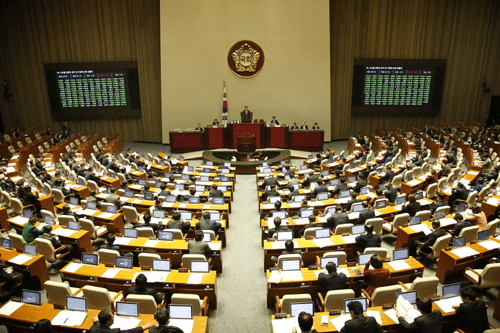 |
| (Yonhap) |
While public calls for the bill have been fierce, both members of the Saenuri Party and the main opposition New Politics Alliance for Democracy and have expressed worries that the bill could bring side effects, such as by challenging the Constitution.
Questions also linger over the range of people who are subject to the bill, as well as the ambiguity regarding punishments for officials from the civilian sector.
The Anti-Corruption and Civil Rights Commission, the driving force behind the bill’s enactment, also said review of the bill would continue for smooth enforcement.
“The bill touches on an area that was never regulated before, so a clash of opinions is inevitable … We will sort out the issues concerning the bill during the 1 1/2 years (before implementation),” ACRC head Lee Sung-bo said in a press conference on Wednesday.
Meanwhile, various groups from the legal and education fields voiced vehement opposition.
“I don’t understand how the law can apply the same regulations to public officials ― who have to shoulder the responsibility of serving the public ― as the media and private school officials,” said Lee Hun, the head of The Lawyers for Citizens. He pointed out that the ACRC’s data submitted to the Assembly fails to present previous cases of press and private school officials being punished by a same law as the public officials.
“The Assembly has committed ‘legislative tyranny’ by passing a bill that can be interpreted as unconstitutional … As head of state, the president should exercise her veto rights to the bill on the part about the civilian officials,” he said.
Critics point out that since the bill originally targeted public officials, the criteria for what is considered illegal solicitation is based on the civil servants’ code of conduct. The act does not cite an official standard for civilians.
A local lawyers’ group on Wednesday said it will file a constitutional appeal on the anti-graft bill as early as Thursday.
“As a group entrusted with a mission to build a society based on constitutionalism, we cannot condone a law that has unconstitutional elements becoming implemented,” the Korean Bar Association said in a press release.
“The bill has arbitrarily selected the subjects for regulation, including the press, and was ambiguous on the concept of ‘illegal solicitation.’ This bestows an excessively wide range of discretion upon the prosecutors and the court, and violates the principal of equality and precision.”
The Korea Federation of Teacher’s Associations also released a statement lambasting the passage of the bill and said it might submit the case to the Constitutional Court.
“Teachers are expressing concerns that they are being treated as potential criminals and that the bill is making the education circles look like a hotbed of corruption,” said KTFA spokesperson Kim Dong-seok.
Other concerns relate to possible violations of the nation’s criminal code, which absolves families when they hide criminal relatives on the run, or the Constitution as the supreme law outlaws guilt by association.
The Kim Young-ran bill obligates public officials’ spouses to report on their husbands or wives if they become aware of any pay-for-favor deals involving their partners.
Named after the bill’s initial writer, a former Supreme Court justice and ex-head of the ACRC, the bill will take effect 18 months after President Park Geun-hye’s Cabinet approves the bill.
The 1 1/2 year grace period has sparked additional condemnations against politicians, as it prevents the bill from coming into force before next year’s parliamentary elections, exempting the lawmakers who voted for the bill from its restrictions and penalties.
NPAD Rep. Choi Min-hee said, “I will not vote for a bill that has the potential to restrict the freedom of the press.” Choi was one of the 17 lawmakers who abstained in the Tuesday vote.
Choi was referring to fears that authorities could intimidate reporters to prevent them from writing critical stories about the government by threatening to prosecute journalists who had shared meals, or exchanged customary gifts with friends working in officialdom.
The public, meanwhile, appeared to support the anticorruption bill.
A poll conducted by television broadcaster JTBC and opinion surveyor Realmeter on Wednesday, a few hours before the bill passed, showed 64 percent of respondents favoring the bill. Only 7.3 percent said they were against it, while 28 percent said they were unsure.
The poll was conducted on 500 adults nationwide, and has a 95 percent confidence level, plus or minus 4.4 percent. About 6.5 percent of those asked by an automated response system answered the survey.
By Yoon Min-sik and Jeong Hunny
(minsikyoon@heraldcorp.com) (hj257@heraldcorp.com)
Russia salutes ‘Fatherland Defender’s Day’
The Russian Embassy held a reception on Monday to commemorate veterans and servicemen of its armed forces.
“In celebrating our national holiday today ― the Fatherland Defender’s Day ― we pay tribute to our veterans who fought on the battlefields to defend our country’s freedom and independence,” newly appointed Russian Ambassador to Korea Alexander Timonin said in a keynote speech at Millennium Seoul Hilton.
“We also congratulate the officers and soldiers of our glorious armed forces who have set an example of honest and faithful service for the well-being of our citizens.”
Timonin previously served as an ambassador to North Korea from 2012-14 and minister-counselor to South Korea from 2000-04 and 2006-11.
He was appointed the new ambassador to Korea last December, replacing Konstantin Vnukov.
The holiday was introduced in 1919 to commemorate the first mass draft into the Red Army on Feb 17, 1918, as part of the Russian Civil War (1917-22). After several date and name changes, it was given its current name and decreed a national holiday by Russian President Vladimir Putin in 2002.
“Under present conditions, our country is strengthening its position as a democratically, economically and militarily strong nation,” the ambassador said. “Russia has consistently advocated the formation of democratic, equitable and polycentric world order, excluding interference in the internal affairs of other states.”
Timonin has written a number of books and articles on peace and security and multilateral economic cooperation in Korea and Northeast Asia. He participated in the six-party talks aimed at denuclearizing North Korea as a deputy head of the Russian delegation from 2004-06.
The ambassador noted that an integral part of Russia-Korea relations was military cooperation not directed against third countries.
“I am confident that further expanding our bilateral relations and military contacts will contribute to peace and security on the Korean Peninsula and in Northeast Asia,” he said.
This year marks the 25th anniversary of diplomatic relations between Russia and South Korea and Russia’s 70th anniversary of defeating Nazi Germany.
A grand-scale national event is scheduled in Moscow on May 9, to which international leaders, including South Korean President Park Geun-hye and North Korean leader Kim Jong-un, have been invited.
By Joel Lee (joel@heraldcorp.com)
“In celebrating our national holiday today ― the Fatherland Defender’s Day ― we pay tribute to our veterans who fought on the battlefields to defend our country’s freedom and independence,” newly appointed Russian Ambassador to Korea Alexander Timonin said in a keynote speech at Millennium Seoul Hilton.
“We also congratulate the officers and soldiers of our glorious armed forces who have set an example of honest and faithful service for the well-being of our citizens.”
Timonin previously served as an ambassador to North Korea from 2012-14 and minister-counselor to South Korea from 2000-04 and 2006-11.
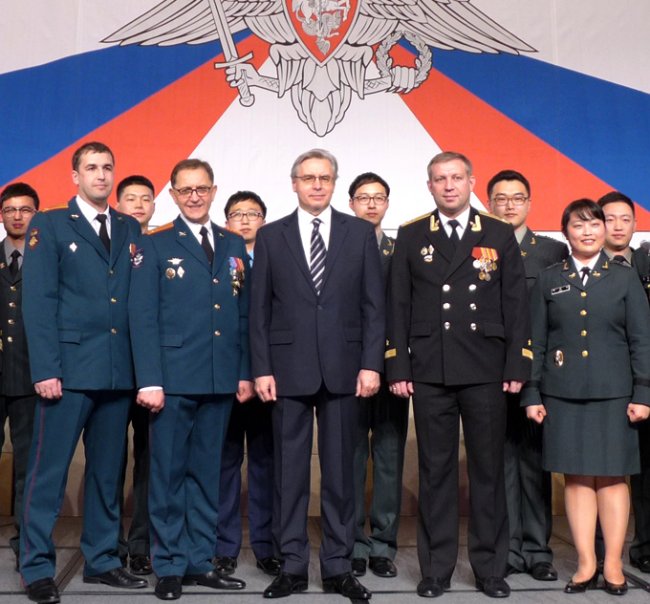 |
| Russian Ambassador to Korea Alexander Timonin (center) poses with military attaches from the Russian Embassy and members of Korea’s Joint Forces Military University in Daejeon at the Fatherland Defender’s Day reception at Millennium Seoul Hilton on Monday. (Joel Lee/The Korea Herald) |
He was appointed the new ambassador to Korea last December, replacing Konstantin Vnukov.
The holiday was introduced in 1919 to commemorate the first mass draft into the Red Army on Feb 17, 1918, as part of the Russian Civil War (1917-22). After several date and name changes, it was given its current name and decreed a national holiday by Russian President Vladimir Putin in 2002.
“Under present conditions, our country is strengthening its position as a democratically, economically and militarily strong nation,” the ambassador said. “Russia has consistently advocated the formation of democratic, equitable and polycentric world order, excluding interference in the internal affairs of other states.”
Timonin has written a number of books and articles on peace and security and multilateral economic cooperation in Korea and Northeast Asia. He participated in the six-party talks aimed at denuclearizing North Korea as a deputy head of the Russian delegation from 2004-06.
The ambassador noted that an integral part of Russia-Korea relations was military cooperation not directed against third countries.
“I am confident that further expanding our bilateral relations and military contacts will contribute to peace and security on the Korean Peninsula and in Northeast Asia,” he said.
This year marks the 25th anniversary of diplomatic relations between Russia and South Korea and Russia’s 70th anniversary of defeating Nazi Germany.
A grand-scale national event is scheduled in Moscow on May 9, to which international leaders, including South Korean President Park Geun-hye and North Korean leader Kim Jong-un, have been invited.
By Joel Lee (joel@heraldcorp.com)
Korea, UAE expanding partnership
ABU DHABI ― Leaders of South Korea and the United Arab Emirates agreed on Thursday to upgrade bilateral relations by expanding cooperation in new areas of medical service, intellectual property, culture, agriculture and renewable energy.
At the summit, President Park Geun-hye and Sheikh Mohammed bin Zayed Al-Nahyan, crown prince of Abu Dhabi, observed the signing of six memorandums of understanding on establishing a Korean cultural center in the Gulf state, expanding the export of Korean-made halal food and agricultural products.
The global market for halal food, which is produced or processed under Islamic dietary guidelines, is expected to grow to $1.62 trillion in 2018 from $1.08 trillion in 2012, according to officials.
Korean food companies have faced difficulties in exporting their products to the Middle East and other Islamic countries due to a lack of market information and low recognition of Korean brands in the regions.
Under the agreement, the two sides will work together to share market info and establish a halal food certificate system, to open doors for Korean firms seeking international opportunities. If realized, they are expected to export $1.2 billion worth of food products by 2017, officials said.
“The agreement is expected to help Korean agricultural products make inroads into the Middle East for the first time,” said An Chong-bum, senior presidential secretary for economy.
The two countries are also set to seek opportunities to enter emerging markets in Africa and the Middle East by combining South Korean nuclear reactor technology with the UAE’s funding power.
On the occasion of Park’s visit to the wealthy Gulf nation, officials from two countries also signed separate MOUs to expand cooperation in the fields of medical service, oil exploration and education.
The summit on Thursday was their third meeting after Park entered office in early 2013.
This is Park’s second visit to the wealthy Gulf state. The South Korean president visited the UAE last year for a ceremony marking the installation of a Korean-built nuclear reactor at a power plant under construction in Barakah, some 300 kilometers west of Abu Dhabi.
South Korea signed a final agreement in 2009 to build four nuclear reactors. The project worth $20.4 billion marked South Korea’s first exports of nuclear reactors.
Park said in an interview with Emirates News Agency that the construction of a nuclear power plant by Korean firms in Barakah carries “great symbolic significance” as it has laid the groundwork for bilateral cooperation for “the next hundred years.”
The president also called for joint efforts to advance the bilateral ties by shifting the focus from heavy industries to high-value-added industries.
“Rather than remaining content with what we have achieved thus far, we are eager to expand the sphere of cooperation to a much broader range of areas, including health care, intellectual property, IT and new and renewable energy,” she said.
The UAE is her third destination of the four-nation trip to the Middle East. Park leaves for Qatar on Friday.
By Cho Chung-un, Korea Herald correspondent
(christory@heraldcorp.com)
At the summit, President Park Geun-hye and Sheikh Mohammed bin Zayed Al-Nahyan, crown prince of Abu Dhabi, observed the signing of six memorandums of understanding on establishing a Korean cultural center in the Gulf state, expanding the export of Korean-made halal food and agricultural products.
The global market for halal food, which is produced or processed under Islamic dietary guidelines, is expected to grow to $1.62 trillion in 2018 from $1.08 trillion in 2012, according to officials.
Korean food companies have faced difficulties in exporting their products to the Middle East and other Islamic countries due to a lack of market information and low recognition of Korean brands in the regions.
Under the agreement, the two sides will work together to share market info and establish a halal food certificate system, to open doors for Korean firms seeking international opportunities. If realized, they are expected to export $1.2 billion worth of food products by 2017, officials said.
“The agreement is expected to help Korean agricultural products make inroads into the Middle East for the first time,” said An Chong-bum, senior presidential secretary for economy.
The two countries are also set to seek opportunities to enter emerging markets in Africa and the Middle East by combining South Korean nuclear reactor technology with the UAE’s funding power.
On the occasion of Park’s visit to the wealthy Gulf nation, officials from two countries also signed separate MOUs to expand cooperation in the fields of medical service, oil exploration and education.
The summit on Thursday was their third meeting after Park entered office in early 2013.
This is Park’s second visit to the wealthy Gulf state. The South Korean president visited the UAE last year for a ceremony marking the installation of a Korean-built nuclear reactor at a power plant under construction in Barakah, some 300 kilometers west of Abu Dhabi.
South Korea signed a final agreement in 2009 to build four nuclear reactors. The project worth $20.4 billion marked South Korea’s first exports of nuclear reactors.
Park said in an interview with Emirates News Agency that the construction of a nuclear power plant by Korean firms in Barakah carries “great symbolic significance” as it has laid the groundwork for bilateral cooperation for “the next hundred years.”
The president also called for joint efforts to advance the bilateral ties by shifting the focus from heavy industries to high-value-added industries.
“Rather than remaining content with what we have achieved thus far, we are eager to expand the sphere of cooperation to a much broader range of areas, including health care, intellectual property, IT and new and renewable energy,” she said.
The UAE is her third destination of the four-nation trip to the Middle East. Park leaves for Qatar on Friday.
By Cho Chung-un, Korea Herald correspondent
(christory@heraldcorp.com)
Subscribe to:
Comments (Atom)



